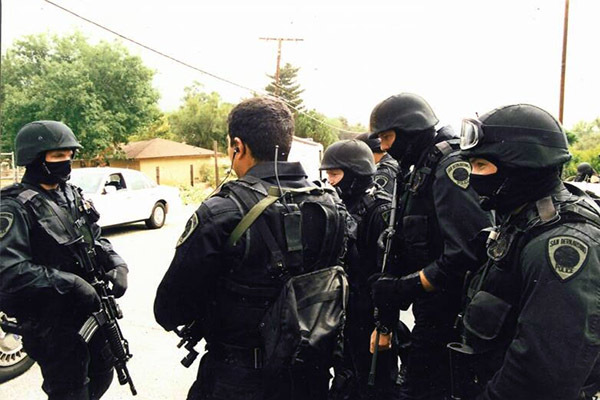In September, the United States Court of Appeals for the Eleventh Circuit issued a stinging 44-page rebuke to Orange County police officers, for their role in a SWAT-style, warrantless raid executed against an Orlando, Florida barber shop catering largely to African- and Hispanic-American clientele.
On August 19, 2010, two inspectors from the Florida Department of Business and Professional Regulation (DBPR) visited Strictly Skillz, a barber shop in Orlando’s Pine Hills neighborhood, finding no evidence of code violations. Individual work areas surrounding barber chairs were found to be compliant with state regulations, and all workers were properly licensed.
Two days later, however, DBPR health inspector Amanda Fields and Orange County Sheriff’s Office (OCSO) corporal Keith Vidler returned to the barbershop, backed by squads of armed police officers to conduct another “inspection.”
According to court documents, county law-enforcement agents blocked exits from the parking lot, so no one could enter or leave. Despite a lack of “reason to believe that the inspection of Strictly Skillz posed a threat to officer safety,” police officers donning bulletproof vests and riot-masks rushed into the otherwise quiet barbershop “like a SWAT team.”
According to reports of the incident, police swarmed through the private business, inspectors demanded to see barbershop licenses again while handcuffing customers and employees. Remarking on the case before her, judge Robin Rosenbaum wrote that “it was a scene right out of a Hollywood movie.”
Inspections conducted by state regulatory boards, the court ruled, “must be ‘appropriately limited,'” and “may not serve as a backdoor for undertaking a warrantless search unsupported by probable cause.”
In response to an employee’s protests that no crimes or code violations had been committed, OCSO agents allegedly expressed confidence that their raid would bear fruit, replying that “it’s a pretty big book,” in which they would “find something in here to take you to jail for.”
Critics of the Florida regulatory agency’s actions allege that the 2010 raid was conducted in order to enable law enforcement agents to bypass the Fourth Amendment, using a regulatory agency inspection to check for possible drugs on the premises, “gather intelligence,” and “interview potential confidential informants.”
The court expressed hope that state law enforcement would end this practice, noting that the state’s practice of conducting a “run-of-the-mill administrative inspection as though it is a criminal raid” was as unconstitutional as it was in preceding cases heard by the same court.
Noting that the facts of the case so overwhelmingly demonstrated the raid’s excess and unconstitutionality, the court refused to grant qualified immunity to the officers who planned the raid — opening the door to future lawsuits against the government raid’s planners.
Late last month, defendants Travis Leslie and Keith Vidler demanded that the full panel of judges rehear the case, arguing that they had no liability for the raid they organized and executed.
Matt Naugle ([email protected]) writes from Washington, District of Columbia.
Internet Info:
“Berry v. Leslie, Opinion issued by Court and Petition for Rehearing and Rehearing En Banc,” United States Court of Appeals, http://heartland.org/policy-documents/berry-v-leslie-opinion-issued-court-and-petition-rehearing-and-rehearing-en-banc/




